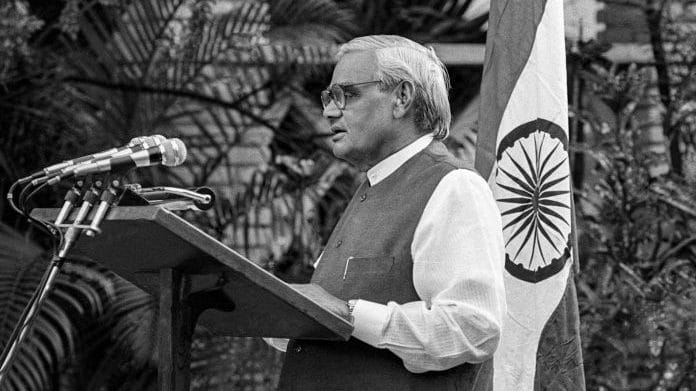Mr Speaker, I thank you for giving me the opportunity to present the government’s position on the joint statement issued by India and America regarding nuclear weapons. I also congratulate the Prime Minister, on behalf of myself and my colleagues, for the goodwill visit to America.
Mr Speaker, this agreement includes mention of several issues in India-America relations. There have been important declarations in this agreement regarding trade, energy, agriculture, science, technology and terrorism. We welcome the increasing cooperation between our two countries in the fields of trade, agriculture and science. We are making efforts to find new means to increase energy production.
The matter about which we are concerned is India’s changing nuclear policy. India has, till now, maintained an independent nuclear policy, and the world has recognised this policy and the efforts of our scientists. Whether it is the Pokhran nuclear explosions or the generation of nuclear electricity, or using nuclear energy to fight cancer, our scientists have recorded many achievements in every sphere of nuclear science over the last few decades. All this has been possible due to an independent policy, the control of which has always remained in our hands.
Whether the government was Congress or NDA, one issue was never compromised — and that was the independence of India’s nuclear policy.
After the nuclear test explosions in Pokhran, many countries of the world launched a campaign against us.
We were faced with serious economic and strategic challenges. Even in these difficult circumstances, India’s nuclear policy remained independent.
Despite possessing nuclear weapons of strategic importance, we had declared very clearly that India shall never be the first to use nuclear weapons. India shall also not use nuclear weapons against countries that do not possess such weapons.
We made the concept of a “credible minimum nuclear deterrent” the cornerstone of our nuclear policy. We do not wish to join the arms race. We remain as committed to nuclear disarmament today as we were during the time of Nehruji. The world has confidence that our nuclear weapons are under non-military (civilian) control.
The Indo-US agreement has raised many questions about the independence of our nuclear policy.
The first matter of concern is the promise made by India that the nuclear programme will be divided into two parts—one strategic and the other non-strategic.
I am sure the government must have discussed this with scientists before agreeing to such a condition. The government must be aware of the technical difficulties involved in such a division.
The more important question is whether this will impact our strategic capabilities. As circumstances change, our strategic requirements will also change. In this era of terrorism, can we say with certainty today what kind of weapons will be needed and when? If we define limits now for the nuclear programme, will our hands not be tied in the future?
I demand that the entire nation be taken into confidence on this indirect restriction on our nuclear capabilities.
The second point of concern in this agreement is the commitment to restrict the production of nuclear materials in cooperation with America. Who will participate in this agreement?
Our scientists are engaged in using the country’s abundant thorium reserves for nuclear energy production. Will international inspections affect these efforts? If we succeed with thorium technology, all barriers to the peaceful use of nuclear energy will be overcome.
In this agreement, the USA has not recognised India as a nuclear weapons state. America has called India — and I quote — “a responsible state with advanced nuclear technology.” Brazil, Canada, Germany, and Japan possess the most modern nuclear technology, just as India does. But there is one difference: they do not possess nuclear weapons, which India does. Despite this difference, will India receive the same facilities as these countries?
Editor’s note: This speech has been translated from the original in Hindi.
This is part of ThePrint’s Great Speeches series. It features speeches and debates that shaped modern India.






